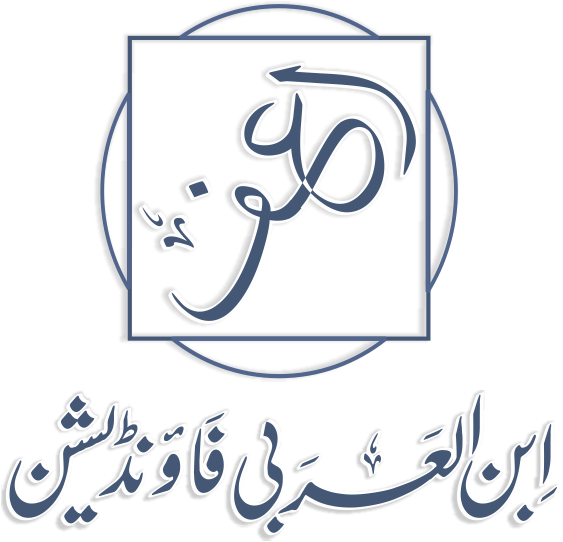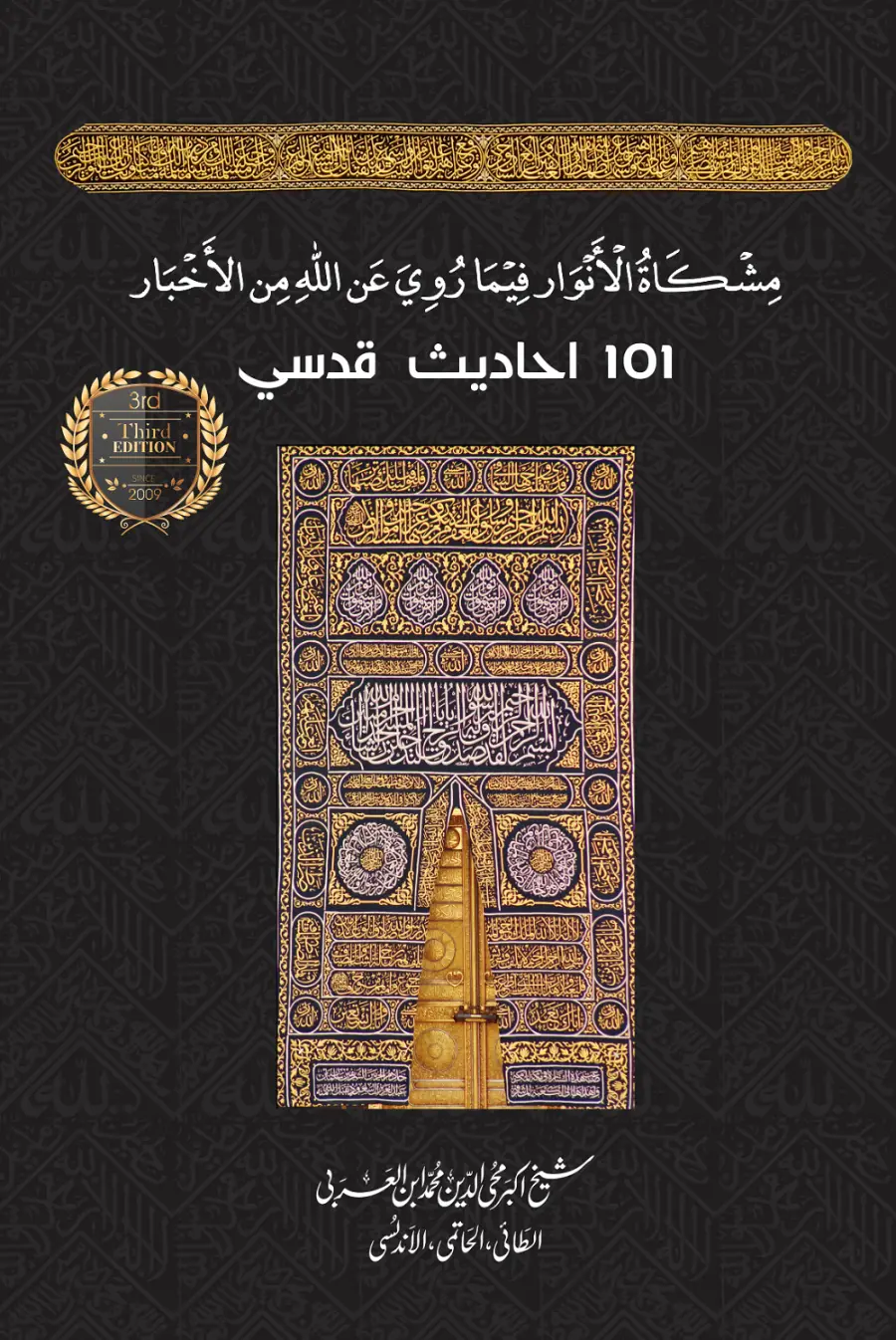Mishkat al-Anwar
101 Hadith al-Qudsi
By Shaykh al-Akbar Muhyiddin Ibn al-Arabi
Mishkāt al-Anwār is a collection of 101 sayings that hold great significance and influence in the early Islamic tradition. It is considered as one of the most important collections of hadith qudsi, which are the sayings of Prophet Muhammad that were revealed to him by Allah. This book, translated by the Ibn al-Arabi Foundation, presents the full Arabic text of Mishkāt al-Anwār with notes and selected commentary from the other works of Shaykh al-Akbar. The translation is compiled from the best early manuscripts and critically edited by Abrar Ahmed Shahi. The book marks the first complete Urdu translation of the original Arabic text, providing access to the insights and wisdom contained in the sayings to a wider audience. The hadith qudsi included in the book cover a range of topics, from the nature of Allah and His attributes to the virtues of faith, prayer, and charity. The commentary included in the book offers valuable insights and context to the sayings, shedding light on the historical and cultural context in which they were revealed. This book is an invaluable resource for those seeking to deepen their understanding of the Islamic faith and its teachings, as well as for scholars and students of Islamic studies.
8 Manuscripts
8 Key Manuscripts Collated from the most reliable global sources (Tier 1 & Tier 2).
350 Pages
Best Arabic Critical Edition, checked and collated with the best available manuscripts
Urdu Translation
Complete Urdu translation, easy to understand and comprehend
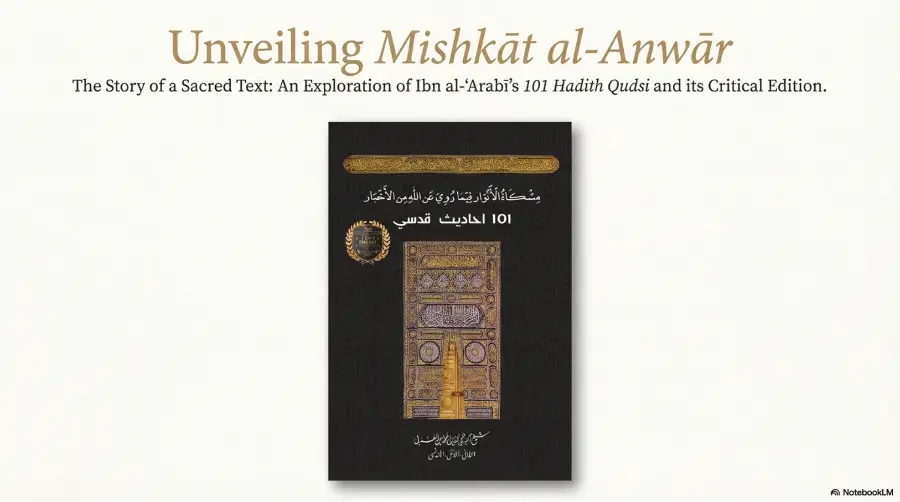

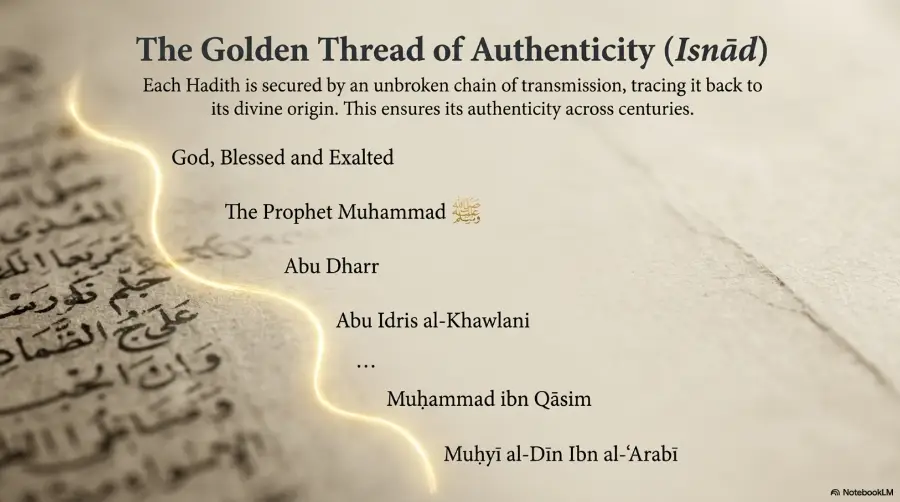
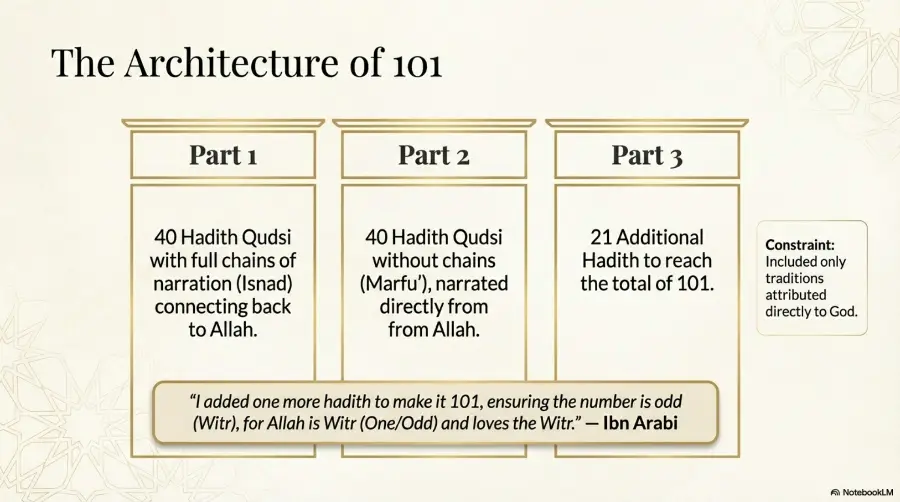
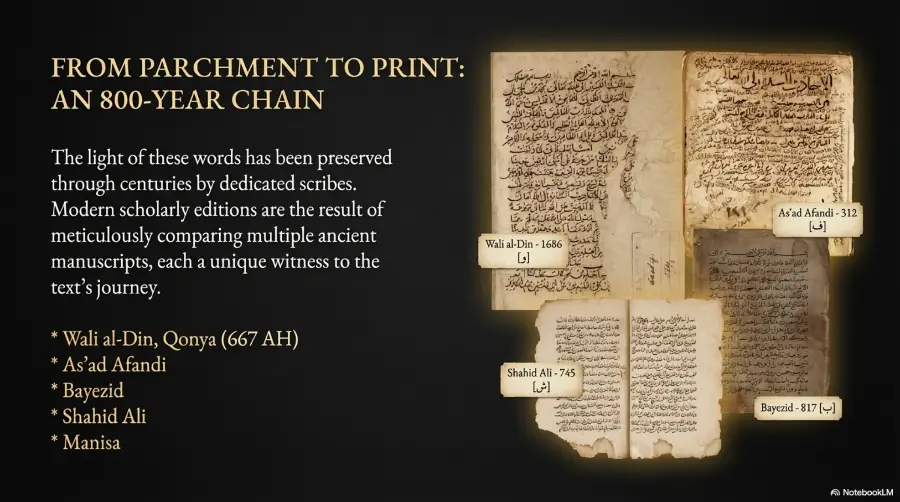
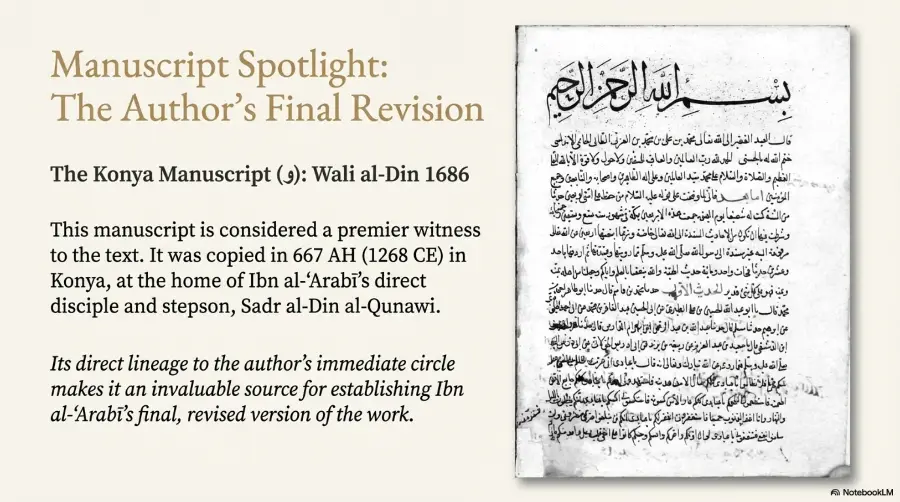
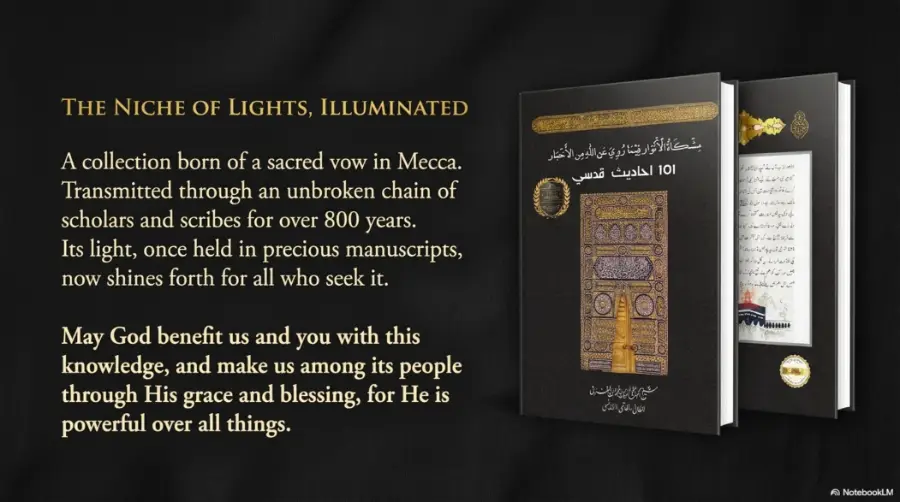
Edition Highlights
Critical Edition
based on 8 best Manuscripts
This edition establishes a new benchmark for accuracy, meticulously cross-referencing seven of the most reliable manuscripts (categorized as Tier 1 and Tier 2). Variant readings and editorial decisions are clearly noted, providing unparalleled textual integrity.
Details
Arabic Title: مشكاة الأنور فيما روي عن الله من الأخبار
English Title: 101 Hadith Qudsi
Author: Shaykh al Akbar Muhyiddin Muhammad Ibn al-Arabī
Edited and translated by: Abrar Ahmed Shahi
Pages: 320 Paper Type: 70gsm IK imported
Year of Publication: 2016
Edition: 3rd (2022)
Urdu Translation
By Abrar Ahmed Shahi
مشکاة الأنوار
بسم اللہ الرحمن الرحیم
الحمد للہ رب العالمین والصلاة والسلام على سیدنا محمد وآلہ وسلم۔
“مشكاة الأنوار فيما روي عن الله من الأخبار” شیخ اکبر محی الدین ابن عربی کی منتخب ۱۰۱ احادیث قدسی پر مشتمل ایک نادر تالیف ہے، جسے ابن العربی فاونڈیشن میں ابرار احمد شاہی نے شائع کیا ہے۔ یہ کتاب شیخ اکبر کے علوم حدیث سے تعلق کو ثابت کرتی ہے کہ تصوف ظاہری و باطنی علوم کا مکمل مرقع ہے۔ اس ایڈیشن کو آٹھ سے زائد نادر عربی مخطوطات کی روشنی میں دقیق تحقیق کے بعد تیار کیا گیا ہے، جس سے عرب دنیا میں شائع ہونے والے ناقص متون میں پائے جانے والے معنوی تحریفات سے محفوظ ایک مصدقہ متن میسر آیا ہے۔
ہر حدیث کی تخریج جامع کتب التسعہ (سوفٹ وئیر) کے ذریعے بین الاقوامی حدیث نمبرز کے ساتھ کی گئی ہے، جبکہ سلیس اردو ترجمہ اور “خلاصہ کلام” کے عنوان سے قرآن و حدیث کی روشنی میں شیخ اکبر کے اقتباسات پر مبنی مختصر شرح شامل ہے، تاکہ حدیث کے باطنی معانی واضح ہو سکیں۔ جدید اضافات میں موضوعاتی فہرست اور تحقیقی حواشی بھی شامل ہیں۔ یہ ایڈیشن علمی اصولوں پر تیار شدہ مستند ترین نسخہ ہے، جو محققین اور طالبانِ حق کے لیے معتبر ماخذ کی حیثیت رکھتا ہے۔
Manuscripts Detail
1- valiuddin 1686
“This exquisite manuscript (Codex Valiuddin 1686, marked with ‘و’) in Naskh script contains the valuable work Mishkāt al-Anwār. The scribe completed copying this entire collection in 667 AH (1268/69 CE) at the home of Shaykh Ṣadr al-Dīn al-Qūnawī in the city of Konya. The collection brings together seven treatises by Shaykh al-Akbar, namely: Mishkāt al-Anwār, Kitāb al-Khalwah, Risālat al-Anwār, Kitāb al-Tajalliyāt, Kitāb al-Maqṣad al-Asmá, Kitāb al-Mubashshirāt, and Kitāb al-Azal. The entire manuscript is transcribed by a single scribe. Regarding Mishkāt al-Anwār specifically, it was copied from Shaykh al-Akbar’s final authorized version, as its text differs from the first version. Each ḥadīth title is clearly marked in red ink, while the main text is written in black ink. The scribe’s handwriting is clear and easy to read. Occasional corrections appear in the margins. In our assessment, this represents one of the finest manuscript copies of this work.”
2- Esad Efandi 312
This manuscript (Asad Afandi 312, marked ‘ف’) contains a collection of Prophetic ḥadīth, opening with Shaykh al-Akbar Muḥyī al-Dīn Ibn al-ʿArabī’s Mishkāt al-Anwār. The scribe meticulously vowelized the complete ḥadīth texts, employing red ink for headings and black ink for the main body. Scans reveal the manuscript is in deteriorated condition. Marginalia throughout show clear correction marks, indicating collation against source texts after transcription. Pagination errors occur within the work – Mishkāt al-Anwār resumes at ḥadīth #18 on page 7 but is interrupted by unrelated text until page 17. Our research confirms this is a premier manuscript copy, serving as a primary source (Umm copy) alongside the Wali al-Din manuscript.
3- Bayazid 817
This manuscript (Bayazid 817, marked ‘ب’) bears the title on its first page: Al-Aḥādīth al-Musnada ilā Allāh Taʿālā wa-hiya Miʾat Ḥadīth wa-Ḥadīth al-Ilāhiyya (One Hundred and One Divine Hadiths Ascribed to Almighty God), compiled by Shaykh al-Imām al-ʿĀrif al-Kāmil al-Muḥaqqiq al-Rāsikh al-Mubarriz Muḥyī al-Dīn Abū ʿAbd Allāh Muḥammad ibn ʿAlī ibn Muḥammad Ibn al-ʿArabī al-Ṭāʾī al-Ḥātimī al-Andalusī, may God be pleased with him and grant him contentment, in Makkah, may God ennoble it. Stephen Hirtenstein attributes the script to Saʿīd al-Dīn / Saʿd al-Dīn al-Farghānī, though no explicit attribution appears in the manuscript itself. Transcribed in clear Naskh script, this codex represents one of the finest copies of Mishkāt al-Anwār, derived from the second recension of the work. It employs red ink for headings and black ink for the main text, maintaining the highest standards of scribal precision.
4- Manisa 2989
This manuscript (Manisa 2989, marked ‘س’) is a collection of over four treatises by Shaykh al-Akbar Muḥyī al-Dīn Ibn al-ʿArabī, transcribed in 678 AH (1279/80 CE). The scribe, ʿAlī ibn Muḥammad al-ʿUrfānī, completed the copy on 16 Muḥarram 678 AH from an exemplar that had been collated against the original autograph (referring to Shaykh al-Akbar’s primary recension). Written in Naskh script with red ink for headings and black ink for the main text, the manuscript exhibits occasional marginal correction marks. The scribe’s hand is clear and legible, and the text closely matches that of the Shahid Ali manuscript. In our assessment, this represents the most faithful transmission of the original recension.
5- Milli 517
This manuscript (Mali 571, marked ‘ل’) in Naskh script is held at the Ankara National Library. Representing an early copy of the treatise, it features an elegant and legible hand by the scribe, executed entirely in black ink. Marginal annotations show traces of collation and corrections. The text aligns with Shaykh al-Akbar’s original recension (nuskha ūlā). Significant physical damage is noted: the opening pages are illegible due to moisture, rendering the beginning of Mishkāt al-Anwār unreadable, while the final page is missing. The transcription date of Muḥarram 668 AH (August–September 1269 CE) is inferred from other treatises in the same codex. Though the library catalogue attributes the script to Ḥasan ibn Thābit, this attribution remains unverified within the manuscript itself.
6- Shahid Ali 1340
This manuscript (Shahid Ali 1340, marked ‘ش’) was transcribed by ʿAbd al-Karīm ibn Abī Bakr al-Jabartī near the Yemeni Corner (Rukn Yamānī) within the Sacred Mosque of Mecca in 789 AH (1387 CE). Mishkāt al-Anwār appears on pages 53 to 75 of the codex, with ḥadīth titles in red ink and main texts in black. While the scribe’s hand is not of the highest quality, the text remains legible. Marginal correction marks indicate collation against source manuscripts. This copy provides an excellent transmission of Shaykh al-Akbar’s original recension (nuskha ūlā). The collection additionally includes several other works by the Shaykh: al-Kalām fī Ḥurūf al-Muʿjam wa-Maʿānīhā; Kitāb Shuʿab al-Īmān; Kitāb Marātib al-Taqwá; Mirʾāt al-Maʿānī fī Idrāk al-ʿĀlam al-Rabbānī; Mashāhid al-Asrār al-Qudsiyya; ʿAnqāʾ Mughrib; Kitāb al-Asfār; Natāʾij al-Adhkār; Ḥilyat al-Abdāl; and Ayyām al-Shaʾn.
7- Fakhr al-Dīn al-Khurāsānī
This manuscript (Fakhr al-Dīn al-Khurāsānī, marked ‘خ’), transcribed in 814 AH (1411/12 CE) in Zabīd, Yemen, holds exceptional significance as an autograph copy by the scribe and Sufi Muḥammad ibn Fakhr al-Dīn al-Khurāsānī. Each ḥadīth opens in red ink. Driven by intense passion for acquiring Shaykh al-Akbar’s works, the scribe traveled to Mecca where he learned of a venerable scholar in Zabīd renowned for immediately transcribing any Ibn ‘Arabī manuscript obtained. Pursuing this lead, al-Khurāsānī journeyed to Zabīd and transcribed this complete compendium at the Madrasa Mazjājiyya, containing sixty-seven treatises and books by Ibn al-ʿArabī al-Ḥātimī al-Ṭāʾī al-Andalusī al-Mursī, demonstrating exceptional dedication to preserving the Shaykh’s corpus
8- Murād Mullā 82
This manuscript (Murād Mullā 82, marked ‘م’) forms part of a larger compendium, with Mishkāt al-Anwār beginning on PDF page 281. The title appears as Mishkāt al-Anwār li’l-Shaykh al-ʿĀrif Muḥyī al-Milla wa’l-Dīn al-Andalusī Raḥimahullāh. Uniquely, this copy synthesizes both Shaykh al-Akbar’s original recension (nuskha ūlā) and secondary recension (nuskha thāniya). The ḥadīth texts employ red and black ink, while their chains of transmission (asānīd) are recorded in the margins. The colophon states: ‘Completed is the book by the praise of God and His gracious facilitation, through the hand of the weak servant hopeful for his Gentle Lord’s mercy, Abū Saʿīd Qāsim al-Ḥājj ibn Aḥmad al-Ḥājj al-Mudaqq […] in early Jumādā al-Ākhir 699 AH (March 1300 CE).
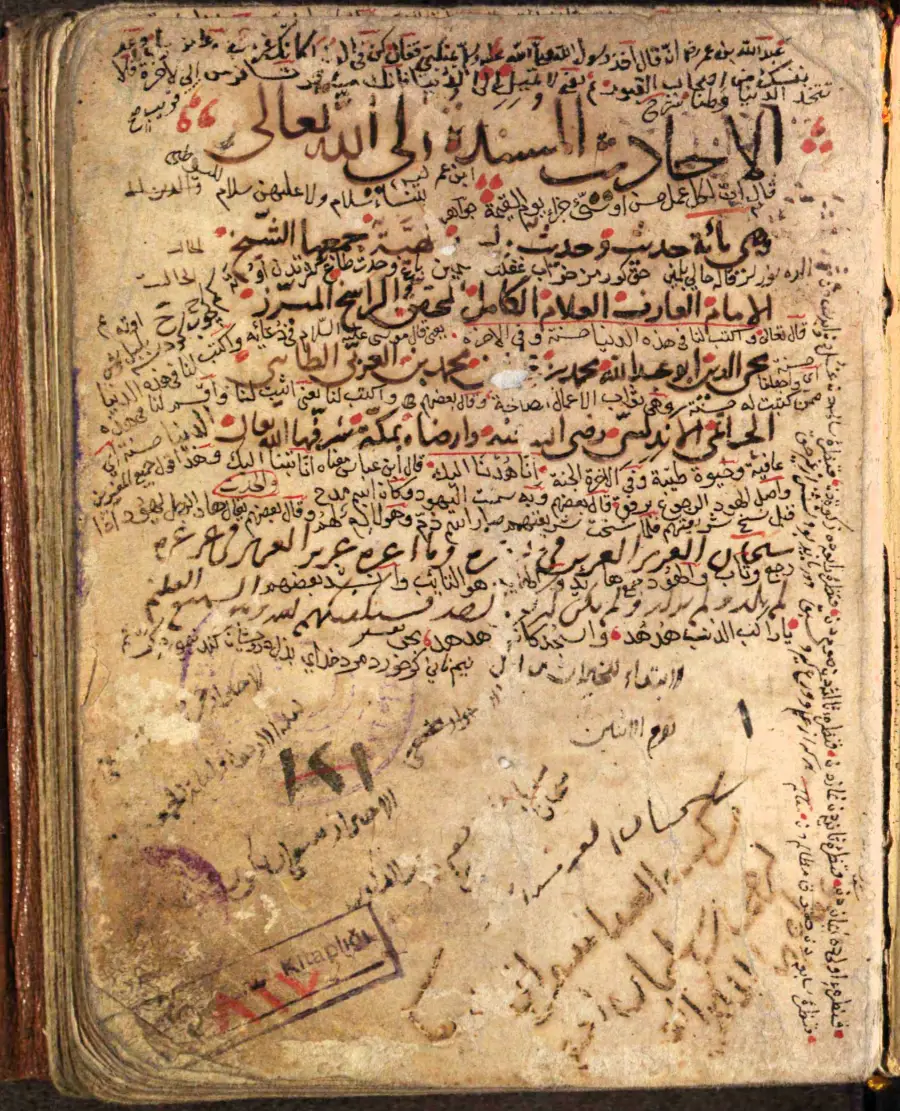
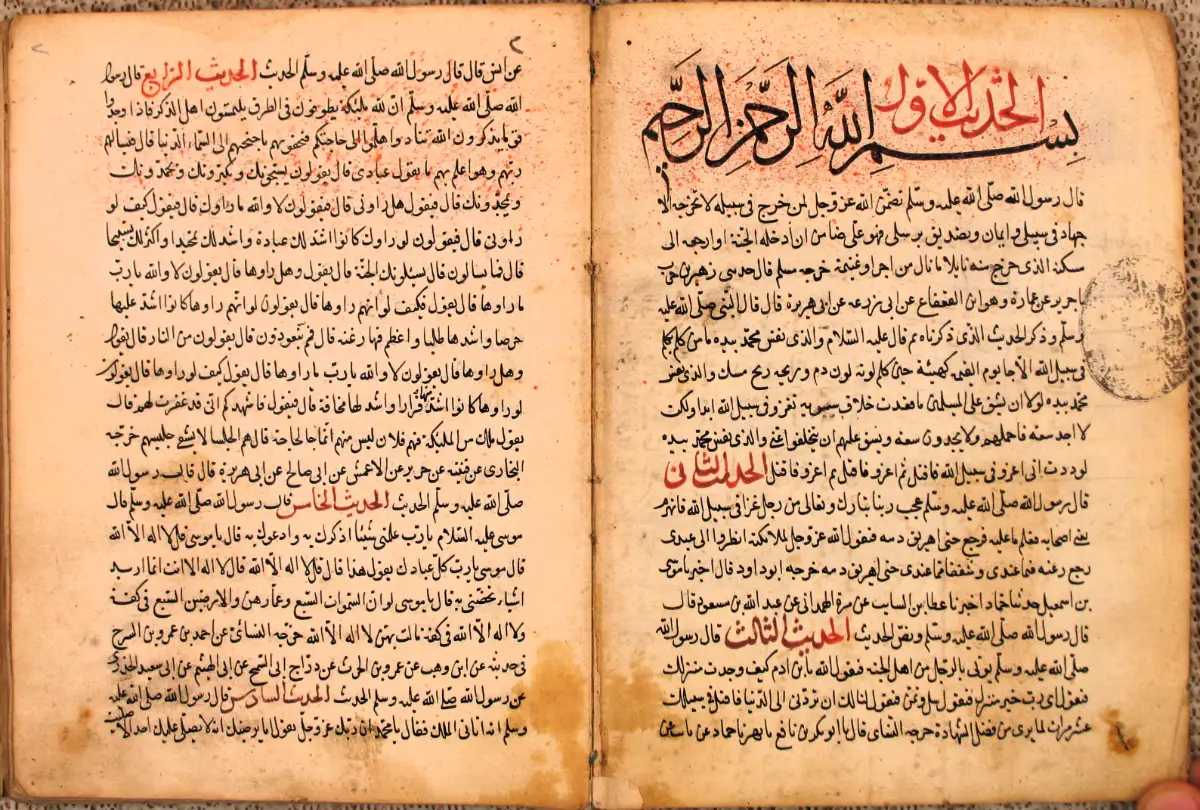
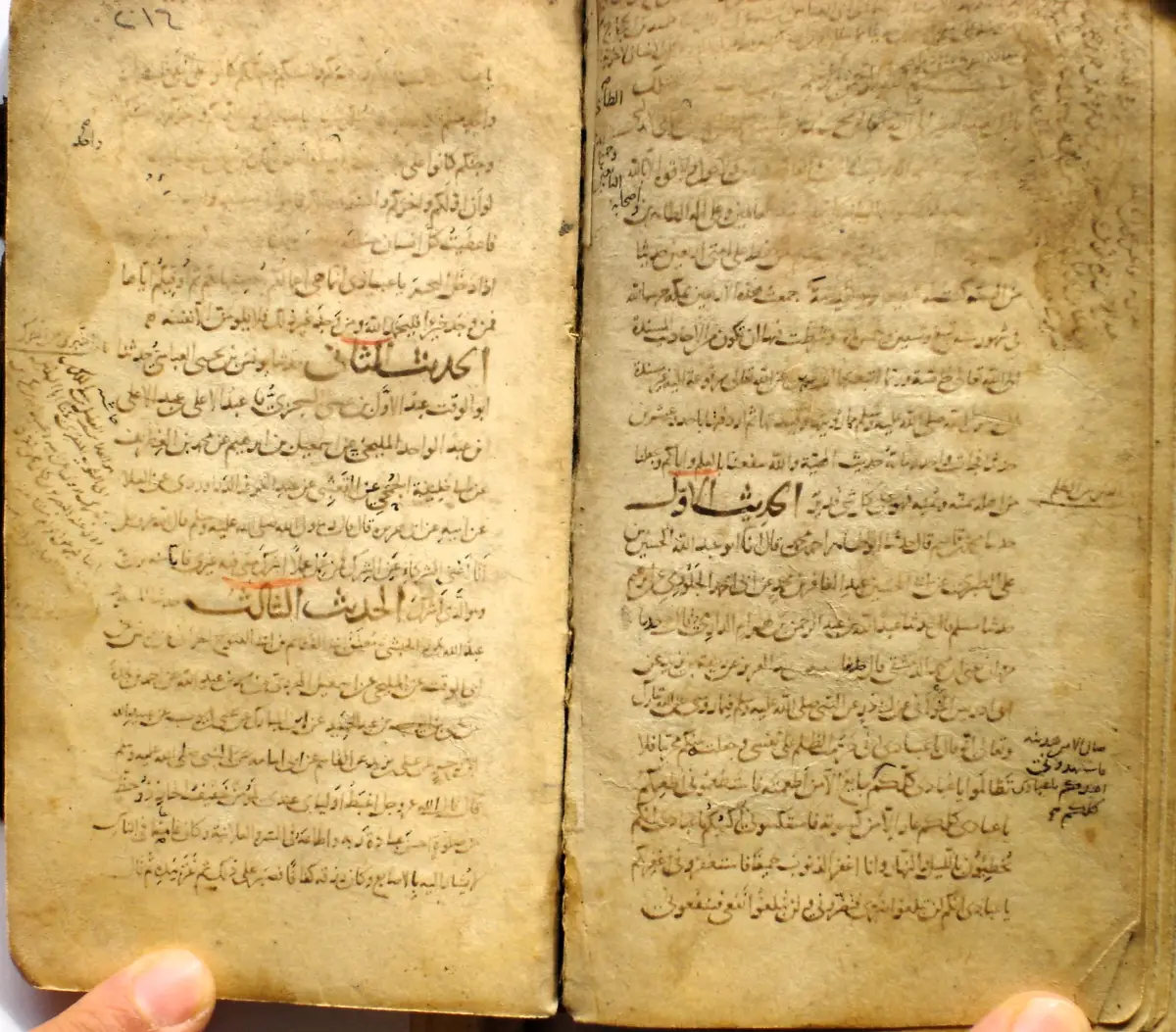
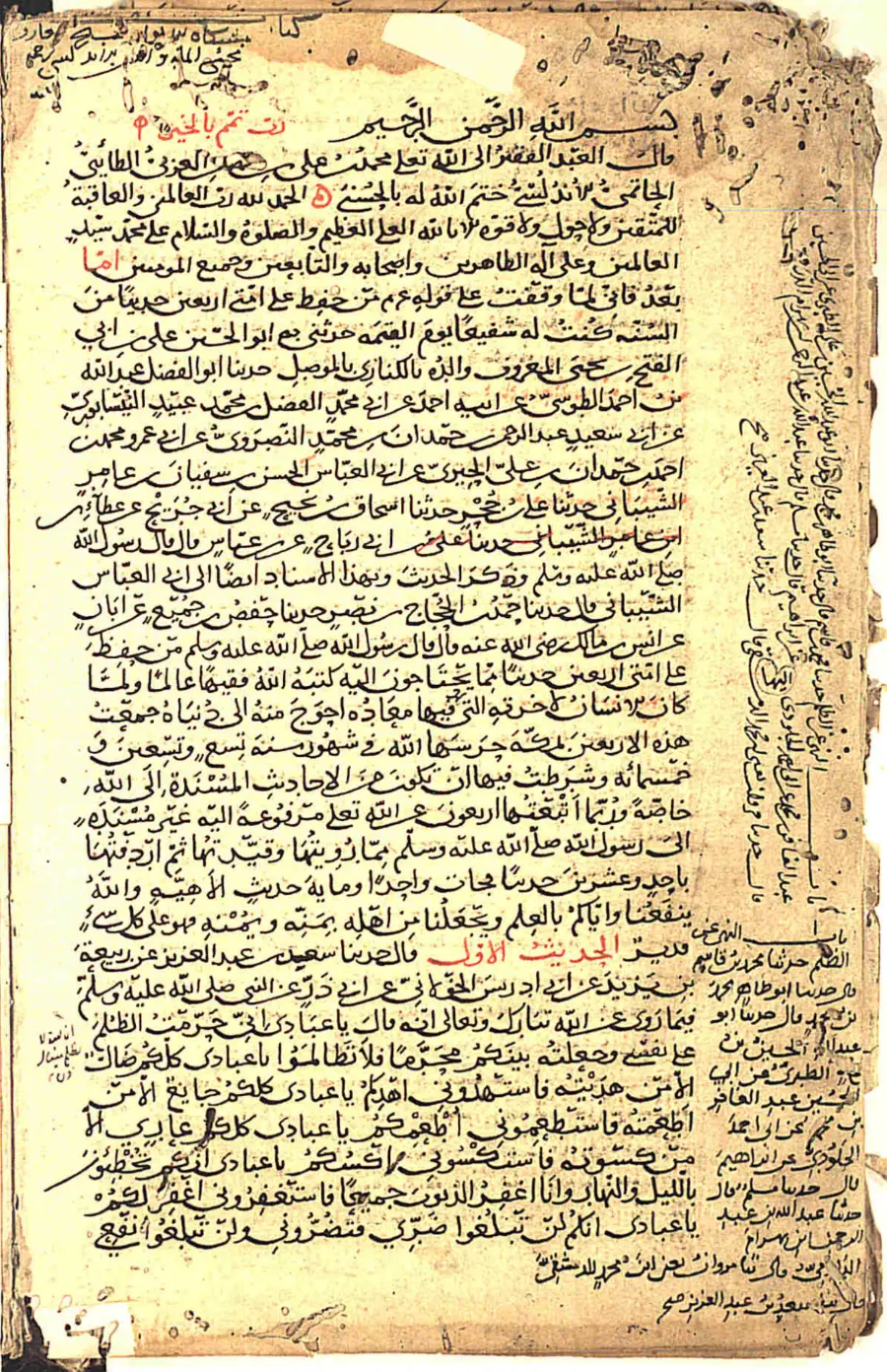
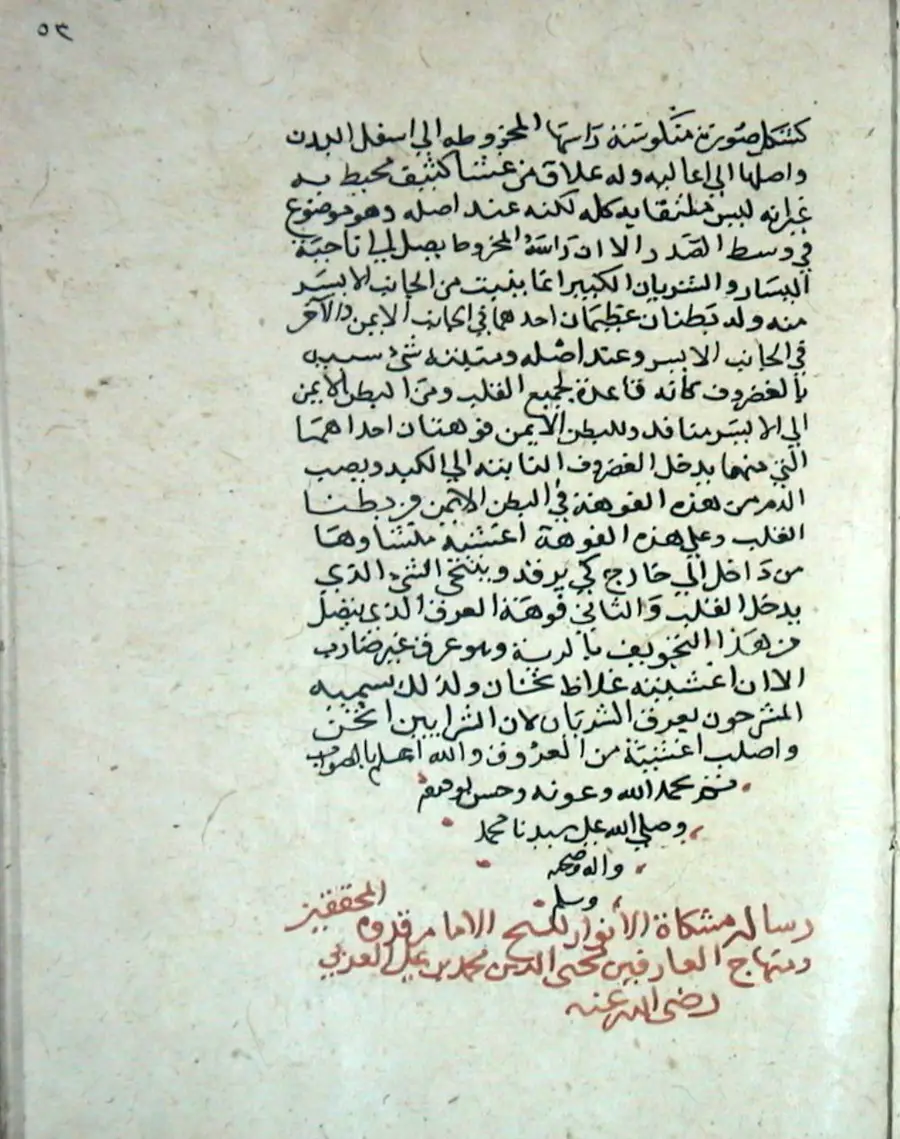
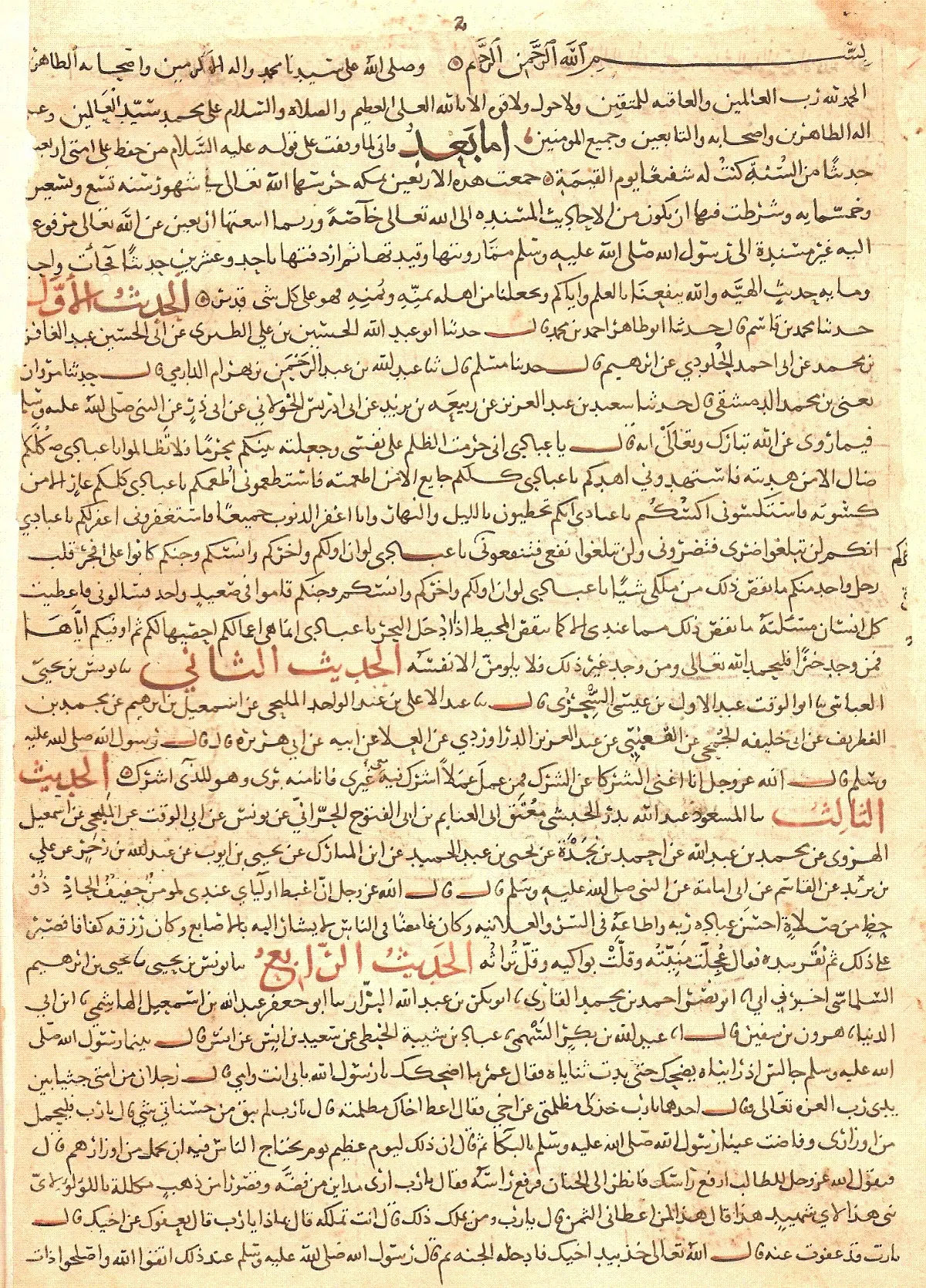
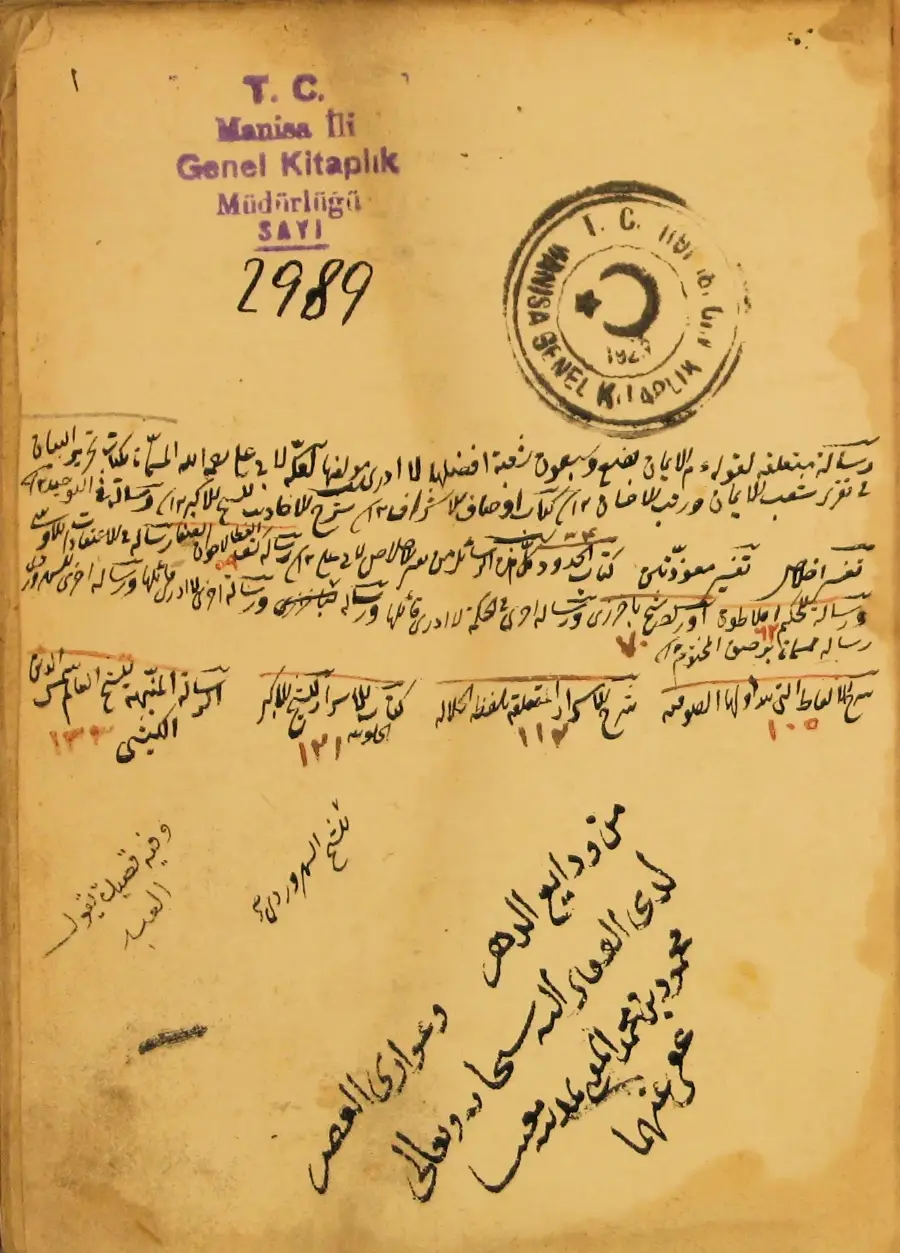
The Author: Shaykh al-Akbar
Muhyiddin Ibn al-Arabi (1165–1240)
Revered as the “Greatest Master” (Shaykh al-Akbar), Ibn al-Arabi stands as one of the most influential and profound figures in the history of Islamic thought. An Andalusian mystic, philosopher, poet, and scholar, his vast body of work explores the depths of metaphysics, cosmology, theology, and the nature of reality itself.
His teachings, particularly on the Unity of Being (Wahdat al-Wujud), have shaped Sufi traditions and Islamic philosophy for centuries. Kitab al-Tajalliyat, the “Book of Theophanies,” is a key work offering intimate insights into the nature of Divine Self-disclosure.
The Editor & Translator
Abrar Ahmed Shahi
Abrar Ahmed Shahi is a distinguished Pakistani Sufi scholar, Editor & Translator, recognized globally for his dedication to the works of Shaykh al-Akbar Muhiyiddin Ibn al-Arabi. In 2007, he founded the Ibn al-Arabi Foundation, an organization committed to the preservation, translation, and dissemination of the Shaykh’s vast literary heritage.
With over 19 years of focused engagement, Shahi has translated more than 30 of Ibn al-Arabi’s major and minor works into Urdu, making these complex texts accessible to a wider audience. His annotated translations are highly regarded for their scholarly rigor, clarity, and sensitivity to the nuances of the original Arabic.
Spiritually, Abrar Ahmed Shahi has been under the direct guidance of Shaykh Ahmad Muhammad Ali (Egypt) since 2015, he now make bayat and introduce Shaykh’s Tariqa in Pakistan.
In summary his work bridges academic scholarship and traditional spiritual understanding.
